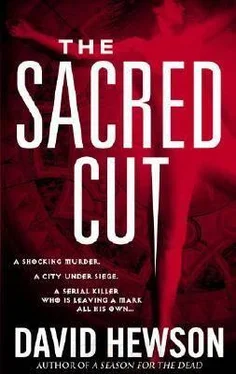“They think you’re something, you know. That SISDE guy told me. My, isn’t he a cryptic piece of work?”
“I really don’t know. I work for the police, not SISDE, though I’m flattered all the same.”
“Or maybe I’m just getting some prime Italian bullshit. ”We got our best man on the case.“ Huh.”
Falcone had finally reached a decision on how to handle Leapman. Gently. Politely. From a distance. Just the way the American least wanted.
“I’ll keep you posted,” he replied.
He walked to the door of the first apartment. It was ajar. The woman, middle-aged, frumpy in a white blouse and black skirt, peered back at him from behind the security chain. She had prematurely grey hair, too long for her. She looked worried.
“Signora?”
He waited for her to unhook the chain, then walked in. The room was overflowing with expensive antique furniture. The contrast with the hovel above could scarcely be more vivid.
“What’s he done?” she asked.
“Perhaps nothing. Was he known to you personally?”
“He answered the ad. He paid a month’s rent and I never saw him again. He went out at night mainly. Don’t ask me why.”
“And his line of work was?”
She lit a cigarette with a shaking hand. “He was a tourist. How should I know?”
Falcone nodded, thinking. “How much does an apartment like that cost these days?”
“Four thousand for the month,” she answered.
“So much money?”
She wanted him out of there. He could feel there was something wrong.
“By law all property owners must keep a note of a foreigner’s passport,” he told her. “You did that, of course.”
She walked over to a small, highly polished bureau and took out a sheet of paper. “I know the rules.”
Falcone studied the page. It was a photocopy of the main ID page of an EU passport.
“Thank you,” he said. “And the receipt? By law you have to give a receipt and keep a copy. For the tax authorities.”
The woman stared at the carpet. Falcone knew: this was what she was hiding.
“You don’t have a receipt, do you? He paid in cash, I imagine.”
“Stupid paperwork,” she hissed. “I’m a widow. Do you think I’ve got nothing better to do than keep receipts?”
“It’s the law,” he said sternly. “Without receipts who’s to know that you’re declaring this income on your tax return? Who’s to say the money just doesn’t go straight into a shoebox under your bed?”
Along with a lot else besides, he guessed. She probably hadn’t declared any income from the apartment for years.
“I have a suggestion,” he said.
She looked into his eyes, hoping. He folded the photocopy of the passport and tucked it in his jacket pocket.
“You don’t tell anyone else about this if someone should come calling,” he said. “And I won’t call the tax people. Is that a deal?”
She didn’t even look grateful. She merely said, “And you wonder why people hate the police.”
Falcone felt a small red flicker of anger begin to burn at the back of his head. “We’re just doing what we suppose you want. It’s not easy, you know. If something happened out there in the street you’d be the first to get on the phone and start yelling at us. Yet in private you’re a little criminal, too, except you don’t quite see it that way. So what are we here for? Just to pick on the people you happen to hate?”
The woman didn’t answer that. She knew when she’d gone too far. Falcone was damn close to changing his mind.
Then something happened: the sound of a siren in the street, voices and, far off, the soft paff of an explosion, a noise he now knew well, one that sent a cold chill of dread straight through his mind.
Before he consciously knew it, Leo Falcone was through the door and running, back towards the Spanish Steps and a visible plume of black smoke rising above the white, white street.
EMILY DEACON SHOWERED, climbed back into the same clothes, then came downstairs into the farmhouse living room and found herself almost blinded by the bright winter light streaming through the windows.
Costa was waiting for her at the foot of the stairs. He looked sickeningly fresh and awake. She envied him. Her head hurt and it felt wrong to be in this beautiful isolated house, not knowing the aftermath of the previous evening’s encounter with the man called Kaspar.
“Where the hell am I, Nic? I need to be back in Rome.”
“Leapman knows where you are. He’s not screaming for you. This is my place. On a day like this it’s twenty minutes, thirty at the most, to the Via Veneto. The Porta San Sebastiano is exactly one kilometre over there.” He pointed at the end wall with its blazing fire.
“Great. I have time for breakfast. And you could tell me what the hell’s going on too, if that’s OK with you?”
He walked her through the large living room into the bright, square kitchen. Gianni Peroni and the girl were busy around a huge hob, happily throwing food into a couple of gigantic pans.
Peroni gave her a mock-sinister leer. “Soon you eat. My new friend Laila and I are cooking Kurdish. Which isn’t that far from Tuscan, just a little less fashionable.”
“Good!” the girl protested. “It’s good.”
Emily walked over, as close as the sputtering fat from the pans allowed, and stared at a banquet of frying food: eggs swimming in olive oil, chunks of bread turning crisp and golden in a mess of whole cloves of garlic, sliced onions and a tangle of half-burnt peppers.
“I don’t suppose you have toast?” she asked. “Or yogurt?”
Teresa arrived with a cup of coffee and gave it to her. “This is a bachelor pad, in case you hadn’t noticed. That means the bread’s all stale and the yogurt… ooh. I have to warn you, Nic. Some of those things in your fridge are so past their sell-by date they wouldn’t count as vegetarian anymore.”
“I’ve been busy,” Costa protested.
“Of course you have,” Teresa said in a deeply patronizing fashion. “How long, Gianni?”
“Come back in five.”
“Done,” Costa said and ushered the two women back into the main room, out of earshot.
Emily Deacon sat down and came right to the point. “OK. What happened with the girl? What did she tell you?”
“Don’t worry,” Costa replied. “We’ve passed it all on to Leapman. She gave us an address. The place she first saw him. Probably where he lived. The chances of him being there now-”
“That’s it? You didn’t get any more?”
The two Italians exchanged glances. “Emily,” the woman said, “this is one seriously screwed-up kid. Even before what happened last night. The charities gave up on her, she was so unreliable, so disruptive. She’s not-if you will excuse a non-medical phrase-right in the head. You can’t just sit down, ask her questions and take notes. Try if you want.”
“Maybe I will. She doesn’t look that way now.”
“She met the man,” Costa said. “This is Peroni’s patch. Give him a starving kid and a couple of pans. Don’t ask me how he does it. I doubt I’ll ever understand. He knew she was hungry, I guess. No, it’s more than that.”
Teresa Lupo cast a backwards glance at the kitchen and sighed. Emily Deacon understood then: there was something going on between her and Costa’s partner.
“He’s being like a parent, for God’s sake,” Teresa sighed. “Nic and I did all the cop things. Threw questions at her. Kept on and on. Gianni waited awhile, sat not saying much, then started listening. Like Nic said. Don’t ask. It’s a gift.”
Emily thought about Gianni Peroni and realized she understood that last point. There was something extraordinarily warm behind that pugilistic facade. All the same…
Читать дальше










